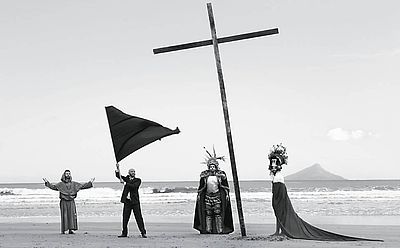Paradoxes of Emancipation
Critical Thinking in the Plural. Conceptual Approaches in Research in the Social SciencesBased on an interdisciplinary analysis of the current crisis of Brazilian democracy and social structure, the Alexander von Humboldt-linkage programme deals with the »Paradoxes of Emancipation«. The case study of contemporary Brazil shows that the complex relationship between democracy and knowledge is neither the same nor the exact counterpart of the much clearer relationship between authoritarianism and fake news. While the discourse of the radical right is based on a deliberate rejection of a knowledge-based shared public sphere, the defense of democratic structures cannot rely on a mere affirmation of the distinction between knowledge and ignorance. For it is precisely this distinction that produces exclusions, divisions and hierarchies that nourishes post-factual discourse.
Projektleitung: Bernardo Bianchi, Oliver Precht
Fördermittelgeber: Alexander von Humboldt-Stiftung (AvH)
Partner: Universidade de São Paulo (USP), Centre Marc Bloch (CMB)
Laufzeit: 2022 (Juli)–2025(Juni)
Based on an interdisciplinary analysis of the current crisis of Brazilian democracy and social structure, the Alexander von Humboldt-linkage programme deals with the ‘Paradoxes of Emancipation’. The case study of contemporary Brazil shows that the complex relationship between democracy and knowledge is neither the same nor the exact counterpart of the much clearer relationship between authoritarianism and fake news. While the discourse of the radical right is based on a deliberate rejection of a knowledge-based shared public sphere, the defense of democratic structures cannot rely on a mere affirmation of the distinction between knowledge and ignorance. For it is precisely this distinction that produces exclusions, divisions and hierarchies that nourishes post-factual discourse.
Mitglieder: Jorge Chaloub (UFRJ), Bruna Coelho (CMB), Maria Luiza Cracel (USP), Thiago Dias (USP), Katia Genel (CMB/Paris 1), Edward Guetti (CMB/American University), Bénédicte Laumond (CMB/Université de Versailles), Benito Maeso (USP/UFPR), Maria Fernanda Novo (USP), Luís César Oliva (USP), Marianna Poyares (The New School), Homero Santiago (USP), Mariana Simoni (CMB/FU Berlin), Jefferson Viel (USP/UFU), Ayşe Yuva (CMB/Paris 1)

- Principal Investigator(s):
- Oliver Precht
- Bernardo Bianchi